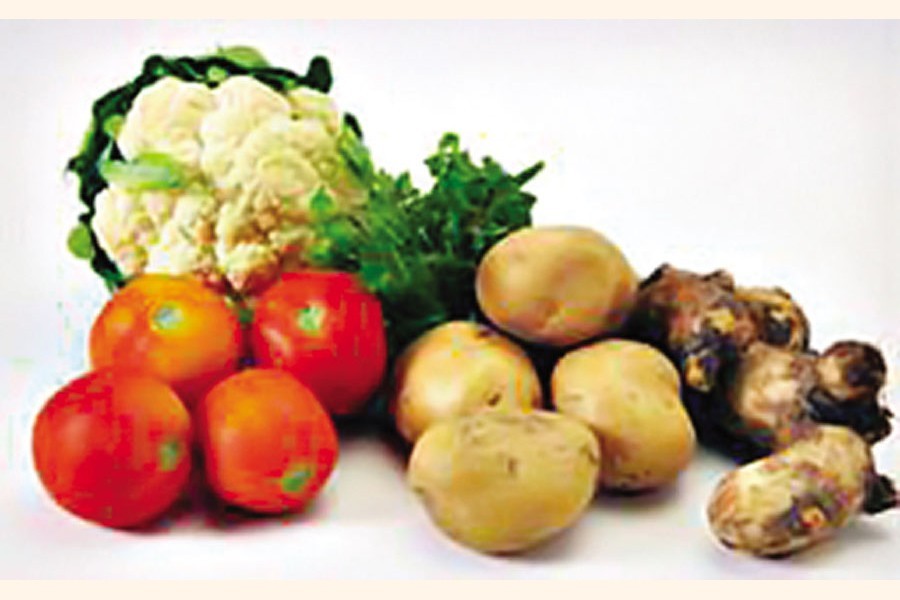A US-funded project undertaken to quicken Bangladesh's agro-product export and import is trying to detect bottlenecks that have been slowing trade clearance from five government agencies.
Officials say exact reasons for delay in releasing agro-products from country's customs ports will be sorted out by scrutinizing working areas of the five major government entities involved with the process.
The entities are Bangladesh Standards and Testing Institution (BSTI), the Department of Fisheries, the Department of Livestock Services, Plant Quarantine Wing of the Department of Agriculture Extension, and Bangladesh Atomic Energy Commission.
The United States Department of Agriculture (USDA)-funded 'Bangladesh Trade Facilitation Project', involving $27 million, has initiated the move avowedly to increase export and facilitate import of agricultural and agro-processed products.
Agricultural trade-facilitation activities under the project, launched on October 1, 2020 with partner organizations VENTURE37, NATHAN, Global Cold Chain, LixICAP, TradeLab, will continue till September 30, 2025 as per schedule.
"An agro-focused time release study, first of its kind in Bangladesh, has also been launched two months ago in Dhaka, Chattogram and Benapole customs houses to collect data related to release of agro-products," says Fuad M Khalid Hossen, Deputy Chief of Party, USDA BTF project.
The TRS is scheduled to be completed next month with findings to take work plan to expedite the procedures, he told the FE.
"We will find out the time needed for completing process by each of five agencies for releasing agro-products," Mr Hossen said.
Time-consuming stages in their process would be identified and recommendation would be placed to agro-based working group and its relevant national committee to resolve the problems, he added.
Capacity development for food safety authority to empower it issue health certificate for agro-products is also going on under the project, he said
Currently, the Export Promotion Bureau (EPB) is issuing health certificate that many countries are not accepting, and it's not mandate of the EPB too, he noted about the problems facing agro-export in particular.
Health certificate is a requirement of importing countries for agro-based products, he said.
Office of the Chief Controller of Import and Export works on issuance of licence-permit, and no-objection certificate (NOC), which might now be issued online
"We are examining how many of them could be issued online as some of agro-products could be certified online and some need physical verification," he added.
The European Union and other developed countries have requirements of traceability maintenance, contract-farming process of agro products, he said.
On November 18, 2021, the project signed an MoU with the Ministry of Commerce to facilitate import and export of agricultural goods
BSTI, Bangladesh Safe Food Authority (BFSA), Bangladesh Customs and the Department of Agriculture Extension will be part of the project.
The capabilities of the testing labs of these organizations will be taken to international standards by developing those and improving the quality of product testing.
Certification complications for export or import will also be eliminated. The certification system will be online-based in order to cut down waiting time for traders.
Furthermore, the commerce ministry will create a completely separate database for importers and exporters of agriculture and agro-processing products.
The database will have information on exporters and importers of various countries, different product demands of different countries, and information pertaining to import and export regulations.
Details of how to get product certification and lab tests done quickly will also be provided.
Aim of the project is to increase the value of agricultural exports and imports by $500 million, reduce import time by 15 per cent, and leverage $12.5 million in private funding. It would benefit around 360,000 individuals across Bangladesh.
From US government part, the USDA, the US Agency for International Development, and US Trade Representative are the stakeholders.
Private-sector stakeholders include the Federation of Bangladesh Chambers of Commerce and Industry (FBCCI), Metropolitan Chamber of Commerce and Industry (MCCI), Dhaka Chamber of Commerce and Industry (DCCI), Bangladesh Agro-processors Association (BAPA), Bangladesh Fruits, Vegetables, Allied Products Exporters Association (BFVAPEA), Clearing and Forwarding agents, shipping agents and freight forwarders.
In a presentation, Mr Hossen laid emphasis on trade-policy reforms aligning TFA commitments, engaging private sector, addressing trade barriers through NTFC platforms and conducting agro-focused Time Release Study (ongoing).
Goal of the project is to simplify, modernize and harmonise process for the export, import and transit of agricultural goods through support to Bangladesh to implement the World Trade Organisation Trade Facilitation Agreement (WTOTFA).
According to customs and port authority data, in 50 per cent cases, it takes up to 72 hours to get the imported goods released.
In 38 per cent cases, importers need to spend 72 to 150 hours for documentary compliance.
In 12 per cent cases, between 150 and 275 hours are required for processing imported goods.
It also shows the cost of documentary compliance is US$ 0.589 for per bill of entry of imported goods.
The data show the completion of documentary compliance for exports needs up to 24 hours while that of the border needs up to 22 hours.
However, businesses say it needs as many as 30 days to get imported products released from the ports. And many agricultural products are perishable.
Businesses also alleged some 'hidden costs' involved in getting their goods released from the ports. This pushes up the product prices at the consumers' end.
Commissioner of Chattogram Customs House Md Fakhrul Alam sought specific information on delay in port as there is no port congestion now.
"Revenue collection grew up to 25.37 per cent until November 30, 2021 at CCH, which proves timely delivery of goods," he said.
He, however, said in case of any misdeclaration or any anomalies it may take some time to release goods.


